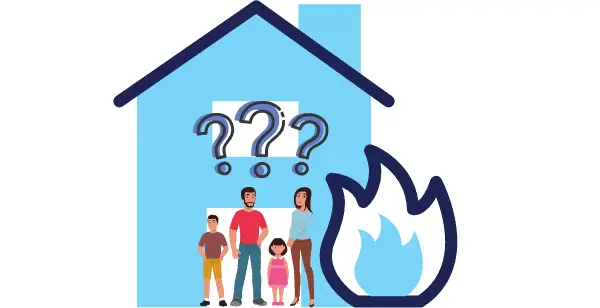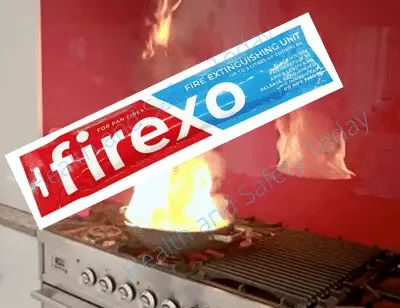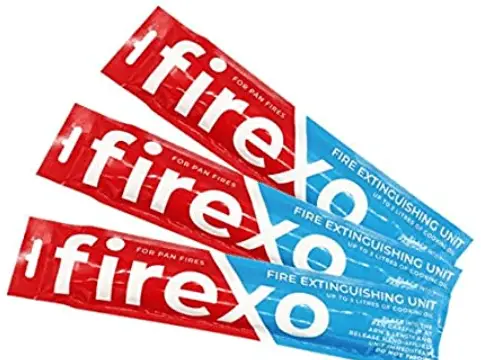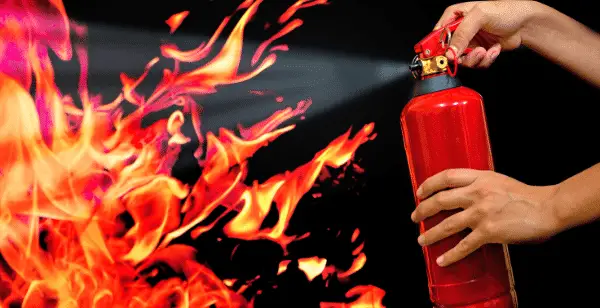What should you do if you discover a fire at home? The difference between having a plan and leaving it to chance may literally be the difference between whether you and your family get out to safety, or perish.
While I appreciate this is a grim statement, sadly it’s also the reality, and one that many people have lived to share the experience, and one that many people have not.
Of course, knowing how to prevent a house fire in the first place is always the best defence, however being aware of what to do if a fire does break out in your home is crucial.

What should you do if you discover a fire?
Tackle the fire or not? This is a subjective question, and one that very much depends on the circumstances, your ability, and equipment you have available to tackle the fire.
The official advice from most fire and rescue departments is to get everybody out by the nearest exit, call the fire service and stay out.
However, this is your home, and the instinct of most homeowners’ is to protect and preserve their property. That’s just human nature.
If you are cooking for example and the pan catches fire, by keeping calm you should be able to contain the fire and extinguish it.
Switch off the gas or electric to remove the heat (DO NOT ATTEMPT TO MOVE OR CARRY A FLAMING PAN TO THE SINK OR OUTSIDE). This may cause a rapid spread of the fire or cause serious injury to you or somebody close by.
Grab your fire blanket and drape it over the pan from front to back to smother the flames. Remember, a fire requires oxygen to burn. By smothering the fire with a fire blanket you are effectively restricting the available supply of oxygen to the fire.
TIP. Never be tempted to lift the blanket to see what’s going on. The sudden rush of oxygen may ignite the pan again.
The pan needs to have fully cooled before checking and removing.
PAN FIRE UPDATE >>>>
The safest and cleanest way to tackle a pan fire at home is with the FIREXO PAN FIRE SACHET.
Watch The Video Below to See How It Works.
WATCH THE FIREXO PAN SACHET IN ACTION
 REVIEW THE BEST PRICE AND AVAILABILITY ON AMAZON
REVIEW THE BEST PRICE AND AVAILABILITY ON AMAZON

Now Also Available In A Triple Pack
 REVIEW THE BEST PRICE AND AVAILABILITY ON AMAZON
REVIEW THE BEST PRICE AND AVAILABILITY ON AMAZON

For other areas in your home, if you have a suitable fire extinguisher and feel confident to use it, then remember the PASS technique.
PASS.
1. PULL the Pin
2. AIM at the base of the flames.
3. SQUEEZE the trigger.
4. SWEEP from side to side.
NEVER throw water on to a pan fire or use an extinguisher that contains water.
>>> See articles on types of extinguishers and uses. <<<
On discovering a fire in your home.
If you discover a fire in your home then you need to act quickly.
Alert everybody in the house and order everybody to get out. Try to stay together if you can.
Don’t stop to collect valuables or look for pets that might be hiding, or may have even run out of the house.
Don’t try to investigate the fire. At this point it could be spreading fast.
If there’s smoke, get down on the floor and crawl. Heat, smoke and toxins rise, and will overcome you very quickly. The air at floor level is cleaner, but it’s being consumed fast so don’t hesitate to make your way out.
On making your way out check any doors with the back of your hand before opening. If the face of the door feels warm then the fire is on the other side. Do not open it. Find another route out.
Try to close any doors as you go along. This will slow the track of the fire behind you and give vital seconds to get out safely.
If your route to safety is blocked by the fire.
If you are on the ground floor and can’t reach a door, or it is locked, go out through a window.
If the window won’t open, get a heavy object and smash the glass making sure you clear jagged edges, or place a heavy material over it such as a coat.
Throw anything out and onto the ground such as cushions to form a soft landing.
Lower children out by their arms before letting them drop – preferably with another adult on the outside to break their fall.
Lower yourself out by your arms from the ledge as far as you can before dropping.
If you can’t get out because you are too high up then gather everybody into one room, preferably with a window. Shut the door and block all gaps around and under the door with anything you can find to stop smoke penetrating through the frame.
Open, or smash the window to let fresh air in, and hopefully you might have a telephone in that room or a mobile phone with you to call the emergency services. If not, shout and scream out of the window to attract attention. This is not a time to be reserved or shy. Every second is precious.
Call the emergency services.
If you’ve managed to get out of the property then run to a safe area and call the emergency services.
999 in the UK. 112 if you are in another country.
TIP. 112 will also work just as effectively in the UK.
- Give the operator your whole address. Speak calmly and clearly. Try not to scream or cry.
- Tell them what is on fire (house, bungalow, apartment etc).
- Tell the operator if anyone is trapped. Try to be as specific as possible so the emergency services know where to go immediately on arrival.
Emergency alerts for deaf or speech-impaired people #
An emergency SMS service is available in the UK, and has been since 2009.
In 2011 eSMS became mandatory, and Ofcom requires all mobile operators to offer the service.
The service user sends one or more text messages to 999 (or 112), which are routed through the Text Relay call centre to the Emergency Services. The call centre is open 24/7 and manned by highly experienced operators who are trained in emergency situations and handling calls from deaf people.
Registered users can access the service from anywhere in the UK, and it utilises automated sending of location.
Users need to register first, but the process is simple by texting 999 to start the registration process. If necessary, someone can register in an emergency and use the service a minute or two later, however it is advisable to register before you actually need to use it.
More information at www.emergencysms.co.uk.
# information courtesy of Humberside Fire and Rescue Service
Common Causes of Fire
Kitchen fires from unattended cooking, grease fires/chip pan fires
Electrical systems that are overloaded, poorly maintained or defective
Combustibles near equipment that generates heat, flame, or sparks
Candles and other open flames
Smoking (Cigarettes, cigars, pipes, lighters, etc.)
Flammable liquids and aerosols
Flammable solvents (and rags soaked with solvent)
Fireplace chimneys not properly or regularly cleaned
Cooking appliances – stoves, ovens
Heating appliances – fireplaces, wood-burning stoves, boilers, portable heaters, solid fuels
Household appliances – clothes dryers, curling tongues, hair dryers, refrigerators, freezers, boilers
Leaking/ defective batteries
Electronic and electrical equipment
Exterior cooking equipment – barbecue
Related Articles.
What are the different types of fire extinguishers?
Review the best selection and prices for home fire control Here


6 thoughts on “What Should You Do If You Discover a Fire?”